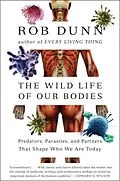"Extraordinary.... takes the reader into the overlap of medicine, ecology, and evolutionary biology to reveal an important domain of the human condition." -Edward O. Wilson, Pulitzer Prize-winning author of Anthilland The Future of Life
We evolved in a wilderness of parasites, mutualists, and pathogens, but we no longer see ourselves as being part of nature. In the name of progress and clean living, we scrub much of nature off our bodies and try to remove whole kinds of life-parasites, bacteria, mutualists, and predators-to allow ourselves to live free of wild danger. Nature, in this new world, is the landscape outside, a kind of living painting that is pleasant to contemplate but nice to have escaped.
The truth, though, according to biologist Rob Dunn, is that while "clean living" has benefited us in some ways, it has also made us sicker in others. As Dunn reveals, our modern disconnect from the web of life has resulted in unprecedented effects that immunologists, evolutionary biologists, psychologists, and other scientists are only beginning to understand. Diabetes, autism, allergies, many anxiety disorders, autoimmune diseases, and even tooth, jaw, and vision problems are increasingly plaguing bodies that have been removed from the ecological context in which they existed for millennia.
In this eye-opening book, Dunn considers the crossroads at which we find ourselves. Through the stories of visionaries, Dunn argues that we can create a richer nature, one in which we choose to surround ourselves with species that benefit us, not just those that, despite us, survive.
"A pleasure to read." - Boston Globe
"[Dunn's] sure use of language, scientific research, and humor... keep the reader highly engaged."- New York Journal of Books
"Not merely interesting but gripping." - Booklist, starred review
Autorentext
Rob Dunn is an associate professor in the Department of Biological Sciences at North Carolina State University and the author of several books, including Every Living Thing. A rising star in popular-science journalism, he writes for National Geographic, Natural History, Scientific American, BBC Wildlife, and Seed magazine. He lives in Raleigh, North Carolina, with many thousands of wild species, including at least one species of mite living on his head.
Klappentext
"An extraordinary book.... With clarity and charm [Dunn] takes the reader into the overlap of medicine, ecology, and evolutionary biology to reveal an important domain of the human condition." -Edward O. Wilson, author of Anthill and The Future of Life
Biologist Rob Dunn reveals the crucial influence that other species have upon our health,our well-being, and our world in The WildLife of Our Bodies-a fascinating tour through the hidden truths of nature and codependence. Dunn illuminates the nuanced, often imperceptible relationships that exist between homo sapiens and other species, relationships that underpin humanity's ability to thrive and prosper in every circumstance. Readers of Michael Pollan's The Omnivore's Dilemma will be enthralled by Dunn's powerful, lucid exploration of the role that humankind plays within the greater web of life on Earth.
